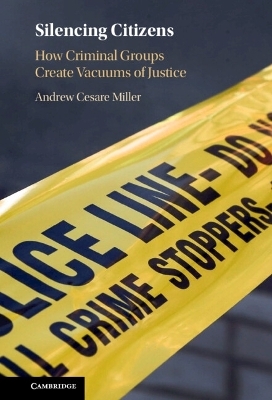
Silencing Citizens
How Criminal Groups Create Vacuums of Justice
Seiten
2024
Cambridge University Press (Verlag)
978-1-009-35448-6 (ISBN)
Cambridge University Press (Verlag)
978-1-009-35448-6 (ISBN)
This book explains how criminal groups like mafias and gangs constrain witness cooperation with the police and what can be done about it. This title is part of the Flip it Open Programme and may also be available Open Access. Check our website Cambridge Core for details.
Criminal groups, like mafias and gangs, often get away with murder. States are responsible for providing justice but struggle to end this impunity, in part because these groups prevent witnesses from coming forward with information. Silencing Citizens explains how criminal groups constrain cooperation with the police not just by threatening retaliation but also by shaping citizens' perceptions of community support for cooperation. The book details a social psychological process through which criminal group violence makes community support for cooperation appear weaker than it is and thus reduces witnesses' willingness to share information with the police. The book draws on a wealth of data including original surveys in two contrasting cities - Baltimore, Maryland in the Global North and Lagos, Nigeria in the Global South. This title is part of the Flip it Open Programme and may also be available Open Access. Check our website Cambridge Core for details.
Criminal groups, like mafias and gangs, often get away with murder. States are responsible for providing justice but struggle to end this impunity, in part because these groups prevent witnesses from coming forward with information. Silencing Citizens explains how criminal groups constrain cooperation with the police not just by threatening retaliation but also by shaping citizens' perceptions of community support for cooperation. The book details a social psychological process through which criminal group violence makes community support for cooperation appear weaker than it is and thus reduces witnesses' willingness to share information with the police. The book draws on a wealth of data including original surveys in two contrasting cities - Baltimore, Maryland in the Global North and Lagos, Nigeria in the Global South. This title is part of the Flip it Open Programme and may also be available Open Access. Check our website Cambridge Core for details.
Andrew Cesare Miller is an Assistant Professor of Political Science at the United States Naval Academy in Annapolis, Maryland. His research focuses on organized crime and policing.
List of figures; List of tables; Acknowledgements; Introduction; Part I. Why Police-Citizen Cooperation Matters: 1. Study motivation: vacuums of justice; 2. Research design and definitions; Part II. How Criminal Groups Prevent Cooperation: 3. Theory: cycles of silence; 4. Evidence: silencing citizens in Baltimore; 5. Evidence: silencing citizens in Lagos; Part III. Interventions for Promoting Cooperation: 6. Theory: reversing the cycles; 7. Evidence: quiet cooperation in Baltimore; 8. Evidence: quiet cooperation in Lagos; Conclusion; Bibliography; Index.
| Erscheinungsdatum | 13.12.2022 |
|---|---|
| Zusatzinfo | Worked examples or Exercises |
| Verlagsort | Cambridge |
| Sprache | englisch |
| Maße | 158 x 235 mm |
| Gewicht | 620 g |
| Themenwelt | Recht / Steuern ► Strafrecht ► Kriminologie |
| Sozialwissenschaften ► Politik / Verwaltung ► Vergleichende Politikwissenschaften | |
| ISBN-10 | 1-009-35448-5 / 1009354485 |
| ISBN-13 | 978-1-009-35448-6 / 9781009354486 |
| Zustand | Neuware |
| Haben Sie eine Frage zum Produkt? |
Mehr entdecken
aus dem Bereich
aus dem Bereich


